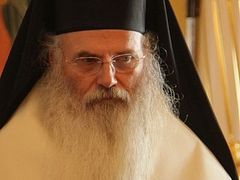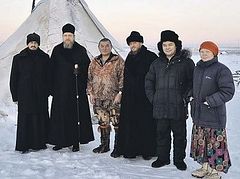 Igor Sikorsky beside his aircraft “Russky Vityaz” A native of Kiev under the Russian Empire, Igor Ivanovich Sikorsky (born May 25/June 7, 1889) gained worldwide fame as an aircraft engineer, primarily as the inventor of the helicopter (as we know it today with its universally recognizable tail rotor design). It is said that Sikorsky’s contribution to the development of air navigation is second to none. Sources tell us that Igor Sikorsky, while still residing in Russia before his immigration in 1918, invented twenty-five types of aircraft, two helicopters, three “aerosleds”, or propeller-driven sleighs, and an aircraft engine. Once settled in the United States, he developed seventeen types of aircraft and eighteen helicopters. He was a pioneer inventor of large passenger planes, among them the four-engine biplane “Ilya Muromets”—a giant flying clipper, the pride of the Russian pre-revolutionary aviation industry. His company, “Sikorsky Aircraft”, founded in 1923, is still operating to this day. A little-known fact: at the beginning of the 1920s, Russian composer Sergei Rachmaninov saved Igor Sikorsky and his company from bankruptcy by sending him a check for $5,000. A few years later, Sikorsky returned the money with interest.
Igor Sikorsky beside his aircraft “Russky Vityaz” A native of Kiev under the Russian Empire, Igor Ivanovich Sikorsky (born May 25/June 7, 1889) gained worldwide fame as an aircraft engineer, primarily as the inventor of the helicopter (as we know it today with its universally recognizable tail rotor design). It is said that Sikorsky’s contribution to the development of air navigation is second to none. Sources tell us that Igor Sikorsky, while still residing in Russia before his immigration in 1918, invented twenty-five types of aircraft, two helicopters, three “aerosleds”, or propeller-driven sleighs, and an aircraft engine. Once settled in the United States, he developed seventeen types of aircraft and eighteen helicopters. He was a pioneer inventor of large passenger planes, among them the four-engine biplane “Ilya Muromets”—a giant flying clipper, the pride of the Russian pre-revolutionary aviation industry. His company, “Sikorsky Aircraft”, founded in 1923, is still operating to this day. A little-known fact: at the beginning of the 1920s, Russian composer Sergei Rachmaninov saved Igor Sikorsky and his company from bankruptcy by sending him a check for $5,000. A few years later, Sikorsky returned the money with interest.
Igor Ivanovich Sikorsky was one of those honest-to-God Russians: a devout Christian committed to the ideals of monarchism.
Despite ending up in emigration, Sikorsky remained true to himself. He headed the Tolstoy and Pushkin Societies and was a member of the Russian National Union in the USA.
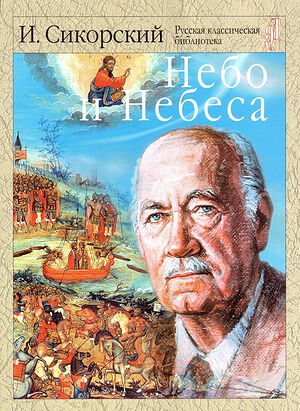 The Skies and The Heaven, I. Sikorsky Some Kievans may still remember the Letnoye Field where young Igor Sikorsky, as well as Pyotr Nesterov, conducted the first, even if sometimes unsuccessful, flights. Today the area is encased in asphalt. But God saved everything, so the unexpected stream of thoughts and ideas of our former [Russian] countrymen, steeped in the true spirit of Orthodoxy, reached us through the thick of the past century, unrest, and global cataclysms.
The Skies and The Heaven, I. Sikorsky Some Kievans may still remember the Letnoye Field where young Igor Sikorsky, as well as Pyotr Nesterov, conducted the first, even if sometimes unsuccessful, flights. Today the area is encased in asphalt. But God saved everything, so the unexpected stream of thoughts and ideas of our former [Russian] countrymen, steeped in the true spirit of Orthodoxy, reached us through the thick of the past century, unrest, and global cataclysms.
As for Sikorsky, we must point out that the religious and philosophical side of his talent has remained practically unknown to us. Some even consider Sikorsky an Orthodox theologian and a missionary.
As we begin to discover I.I. Sikorsky as a philosopher, we are instantly soothed by a comforting thought that not all the “front-runners of the modern civilization” were spiritually clueless. Sikorsky asserts a thought about the futility of the progressivism, the uselessness of technological inventions and social projects if they are devoid of the authentic truth of the Gospel.
His book of select spiritual writings, published in Russia a few years ago, presents Sikorsky to the Russian readers as a solid Orthodox theologian and a missionary.
***
On his Facebook page, Very Rev. Fr. Vladimir Vigilyansky invites readers to grasp the meaning of some of the scientist’s thoughts and offers quotes from Sikorsky’s essay, “Approaching the Precipice:”
Christian faith provided the most powerful life-saving vaccine that has protected men and nations from the deadly effects of the sinister powers of evil that are always present and ready to strike as soon as men slack off morally and spiritually. The advent of the modern era saw the gradual weakening of religious influence until it nearly disappeared from the face of the earth. Respectively, the spiritual powers of evil succeeded in gaining unprecedented dominion and, to a large extent, were able to legalize its principles, goals, and the means to achieve them on a worldwide scale.
A wise Christian of olden time, when asked about the main rule of Christian life, replied, "Never lie to anyone and to yourself, in particular."
"Never lie to anyone and to yourself, in particular." But our modern life is wholly and fully grounded in self-deceit and purposeful disinformation!
In striking contradistinction to the above, modern life is lately based on shocking self-deception and purposefully calculated disinformation of a less enlightened part of mankind. The casual amateurish lies of the past are now superseded by the real science of misinforming the unintelligent. As a result of all this, an honest exchange of opinions and dialogue between groups and nations got further complicated. Words, promises, and solemn obligations become perverse and meaningless, thus elevating intimidation, coercion, and violence to a point when they become the only convincing arguments in the dialogue of groups and nations.
Indeed, a great part of mankind does not want a universal totalitarian tyranny as a form of governance of the global community. What they want and expect is the benevolent and liberal association of peace-loving nations able to prevent war and promote the common good. However, the predominant world ideology and, consequently, the trend of events generated by it, do not leave much hope for such an outcome. In fact, behind the confusingly complicated course of events, the tempting promises of moralistic clairvoyants, and the dense smokescreen of misleading slogans and statements, there surely emerges an outline of a tyrannical super-totalitarian world state.
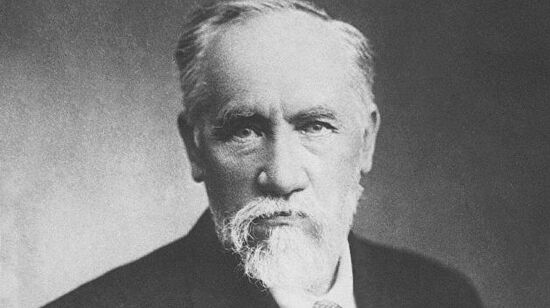 Ivan Sikorsky, the father of the engineer
Ivan Sikorsky, the father of the engineer
Sikorsky, the engineer and the theologian, prophesied not only ahead of his time but likely for another hundred (and probably even more) years to come:
“It is already possible to recognize its [super-totalitarian world state’s] fundamental working principles. The first of them will be “bread”; however, not merely bread as help for the destitute, but mainly in the form of universal control over the necessities of life, or as the means of the utmost physical intimidation and coercion. The second principle will be the deification of the leaders’ personas. Over time, any criticism would be forbidden and the ensuing in-depth propaganda would create a one-of-a-kind halo of sanctity around an almost supernatural authority and power of the leaders. The third principle is the limitless use of deception, coercion and violence on an unprecedented scale, which means a complete moral downfall or, figuratively speaking, the worship of the devil. This is where our civilization is heading today.
A man may never even think of the devil; he may lead a life of an ascetic; more than that, he can even be a faithful supporter of a certain patriotic or humanitarian idea. Yet, at the same time, he can still become, in a strict sense, a follower of the devil if he confidently accepts and promotes the fundamental mystical principles of evil as the only correct ones.
The assistance rendered by the evil mystical powers isn’t explicitly material in its manifestation. It is essentially the peculiar powerful inspiration that nevertheless works exclusively upon the lowermost and the ugliest traits of human character, first and foremost, hatred. It amplifies hatred to a superhuman level and enables the “possessed” man to exercise an exceptionally commanding influence tainting other men with his evil passions. Once subject to this influence, they are blinded by hatred and can lose the ability to pay heed to their voice of reason. They can even lose conscience and become an obedient, yet blind and violent, force of destruction capable of suppressing, crushing, and destroying any obstacles on the "possessed" leader’s way to gain power he so ardently desired.
This process can become the fastest shortcut to a power grab. Undoubtedly, this destructive process physically brings down a great number of innocent people just as it is even more spiritually destructive to those who actively participate in this process. It begins with a lie and increasingly continues to be fuelled by an even greater lie required to keep the hatred up, as well as by way of slander to justify the crimes that have been committed. This utterly dreadful and ultimately appalling process self-generates brutal force and violence dragging the masses down to spiritual ruin.”
 Sikorsky in the cabin of the Sikorsky H-5, 1945 As you read I. Sikorsky’s philosophical remarks, it gets close to impossible to pause since your mind keeps on picking out the significant moments, one after another, from the text, marveling: What a great pity we have never read his works before!
Sikorsky in the cabin of the Sikorsky H-5, 1945 As you read I. Sikorsky’s philosophical remarks, it gets close to impossible to pause since your mind keeps on picking out the significant moments, one after another, from the text, marveling: What a great pity we have never read his works before!
The two opposing ideologies, which are now in deeper conflict as ever before, could be defined as follows: the main principles of Christian ideology include the salvation by way of leading the righteous life, exhibiting the love of neighbor, and living in peace. Their antitheses are the essential elements of opposing ideology, that is, salvation of mankind by way of “temporary” use of deception, hatred, and coercion.
The resulting deep discord may be described by the following examples. Christ said, Ye shall know the truth, and the truth shall make you free (John 8:32). In complete contradiction to this, today’s world leadership has largely adopted the principle of holding back the truth to curtail or destroy freedom.
The Gospel as a whole admonishes us to avoid undue attention and concern for the future course of our lives stressing the importance of life today and in eternity. Contrary to this, the modern leaders distort and contaminate the minds of the current generation disregarding eternity in favor of fanatical pagan devotion to certain future social and economic accomplishments here on earth.
Eternity is rejected—for the sake of possible future social and economic accomplishments
The Gospel truths underscore the infinite value of every human life and specifically lay emphasis on its spiritual side. The modern thought dismisses the value of every separate human life and spiritual individuality in favor of some future inhumane and purely materialistic social order.”
One more thing:
Such a prevailing narrative that largely replaced faith in God and consequently undermined the respect for the virtues of an individual man is a new faith in the enormous super-Moloch and the new world order put forward and imposed by the current conditions of the world. The most aggressive part of mankind considers this supreme idea, practically revered as a new religion, as a guarantee for the creation of a new brave world of universal prosperity, development, and glory. This idea is expected to take over where all religions, including Christian, have failed.”
***
Igor Krishtafovich, who translated a few works by the former Kievan I. Sikorsky from English to Russian and had them published, states that the books about the renowned aircraft designer, as well as his autobiography “The Story of the Winged-S,” have never been translated into Russian. He reasonably maintains that Igor Sikorsky was one of the most profound and original thinkers of the previous century.
In his published translation of I. Sikorsky’s treatise “The Message of the Lord’s Prayer,” I. Krishtafovich notes that the Lord’s Prayer has been a focus of various in-depth studies and commentaries in many world languages. However, Sikorsky’s treatise was the first one produced by “the prominent mind of an aircraft designer who took to set forth and voice his viewpoint as a researcher who was neither bound by canons nor afraid to issue bold conclusions, remaining at the same time a deeply empathic and genuinely believing man.”
In the Lord's Prayer, [Sikorsky writes], we discover that all the significant words and phrases are assembled in such a way that the meaning remains intact regardless of times or the languages spoken. Such words as father, kingdom, will, bread, temptation, earth, and so forth, preserve their definite and identical meaning in every language throughout the centuries. Without a doubt, some of the notions, particularly the words heaven and evil, aren’t easy for understanding and there are different opinions regarding their meaning. But this controversy isn’t caused by the use of particular words or translations but by a deeply mysterious character of the notions they signify.
Analyzing the structure of the Lord's Prayer, we immediately notice the perfect symmetric composition that greatly facilitates its memorization.
We perceive immediately the perfect symmetric composition of the Lord’s Prayer that greatly facilitates its memorization
A child can learn and remember verses much faster than prose, even though he may not yet know the difference… It consists of seven definite passages, which in turn represent two separate prayers of three sentences each, plus the conclusion.
The three sentences of the second prayer refer to the present time and our earthly life, while the rest of the prayer deals mainly with a higher order of things and social being. The inspired writers of olden times would call it the supreme eternal order. It is in perfect harmony with the modern ideas, except that we understand eternity not as the infinite change of days and centuries but as a life in a higher order of existence, above the limitations of time.”
Sikorsky analyzes the Lord’s Prayer in meticulous detail by dividing it into two parts and studying “every sentence separately in an attempt to not only perceive its actual meaning but also its message implicitly contained or reflected in the profound significance of words in the greatest prayer of all-time.”
The Lord’s Prayer gives the author an opportunity to philosophize about “The Brothers Karamazov,” the solar system, and gravitation.
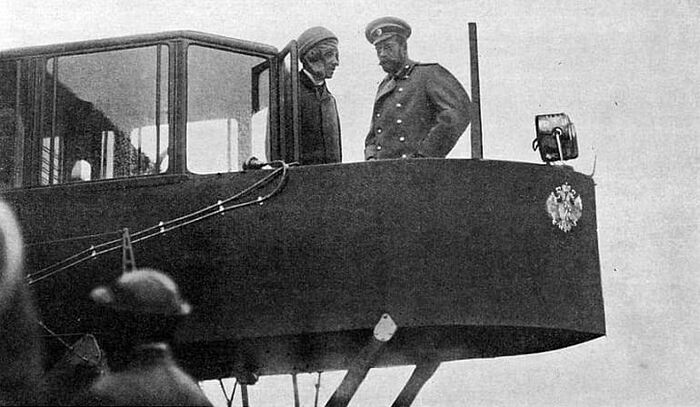 His Imperial Majesty, Emperor Nikolai Alexandrovich, and aviation engineer Sikorsky
His Imperial Majesty, Emperor Nikolai Alexandrovich, and aviation engineer Sikorsky
These prophetic words by I. Sikorsky are about our times and us:
A dreadful moral decay of humanity we are currently witnessing leads to the conclusion that the so-called human progress in the context of modern lifestyle leaves no hope for any kinds of definite and worthy achievements in the future.
More than that, at critical moments, the Kingdom of God in the hearts of men may become a source of their suffering. Christ commanded that His followers are to carry their crosses. It holds a greater meaning than simply being patient with the burden of life. A cross is not only about a heavy load but also about an instrument of torture and death that befell its bearers. A faithful bearing of a cross leads to understanding that a tiny flicker of Divine light in the hearts of men can’t overthrow the imperious violent darkness around. All it can do is to simply sharpen an understanding that truth and goodness are condemned to mockery and persecution in this world.
In the time of relative peace and calm, when civil courtesy and traditional hypocrisy obscures the true nature of the devil, we are prepared to deny its existence thinking that all the instances of barbarity are things of the distant past. At such times, it seems easier for us to believe in the triumph of progress and idealism. But at a time of crisis, that speck of flame of Divine light in our hearts may show us the way to the cross and the Calvary that can become real even if it is merely about suffering spiritually. Those high in spirit and of strong will are capable of bearing their cross, although it would present a challenge to their faith and courage.
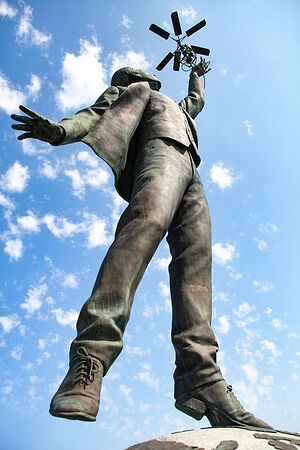 Monument to Sikorsky in Kiev “The first part of the Lord’s Prayer”, [writes Krishtafovich], speaks mainly of the ultimate result of life on earth and the eternal predestination of mankind in the Kingdom of God. By contrast to this, the scientist assumes that the second part of the Prayer beginning from, ‘Give us this day our daily bread’ has to do with the needs and challenges of today’s life and the immediate future. Our appeal is to have ‘our bread’ on ‘this day,’ not tomorrow. The same rings true about the remaining two petitions. Each of the three sayings in the second part of the Prayer has to do with entirely different aspects of our earthly life, and, understood loosely, cover all material and spiritual needs of our present life.”
Monument to Sikorsky in Kiev “The first part of the Lord’s Prayer”, [writes Krishtafovich], speaks mainly of the ultimate result of life on earth and the eternal predestination of mankind in the Kingdom of God. By contrast to this, the scientist assumes that the second part of the Prayer beginning from, ‘Give us this day our daily bread’ has to do with the needs and challenges of today’s life and the immediate future. Our appeal is to have ‘our bread’ on ‘this day,’ not tomorrow. The same rings true about the remaining two petitions. Each of the three sayings in the second part of the Prayer has to do with entirely different aspects of our earthly life, and, understood loosely, cover all material and spiritual needs of our present life.”
“By and large, the human race of today does not realize the value of the protection granted by Christ from the hidden spiritual dangers in this life,” asserts Igor Ivanovich Sikorsky. “In this respect, a modern man may be likened to a child bitten by a rabid dog but clueless about the gravity of danger and the importance of the life-saving vaccine offered by a wise and benevolent Doctor.”
Unfortunately, mankind sees no value in the protection granted by Christ from hidden spiritual danger
“The writer believes,” Krishtafovich continues, “that the last petition of the Lord’s Prayer refers mainly to a mysterious and perilous impact of evil capable of taking on many different forms and even painting himself as a servant to the idealistic or humanitarian principles. The historical process as a whole and the tragic experience of recent times reveals that human intellect and science education are unable to recognize the spiritual powers of evil and helpless to oppose its menacing danger. The scientific discoveries and engineering innovations are serving the cause of evil and assist in the spreading of lies, fear, hatred, and murder on an unprecedented scale. A great number of facts of similar nature confirms the view of Soloviev1 that people and nations are unable to successfully resist the deadly poison of the forces of evil for any significant amount of time provided they find no support from a higher order of being. The writer believes that such support or, in other words, the Divine guidance and protection is being sought in the phrase ‘And lead us not into temptation, but deliver us from evil’."
The quotes from Igor Sikorsky’s works were used from: Igor I Sikorsky, Historical Archives

